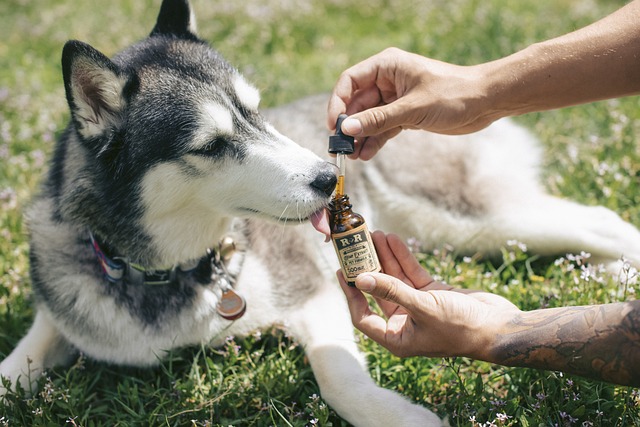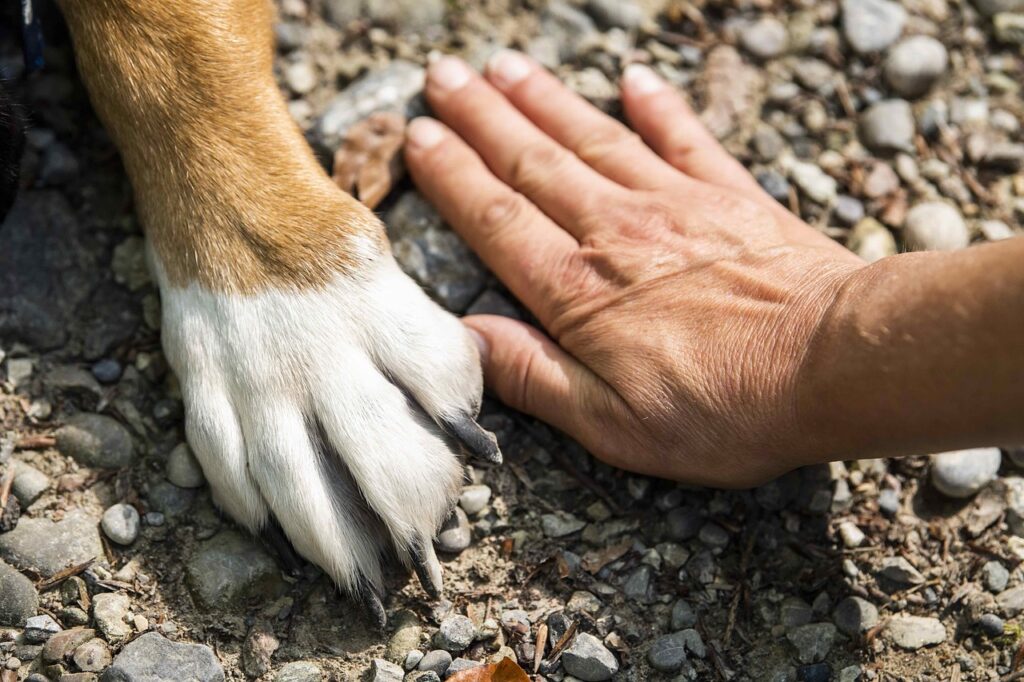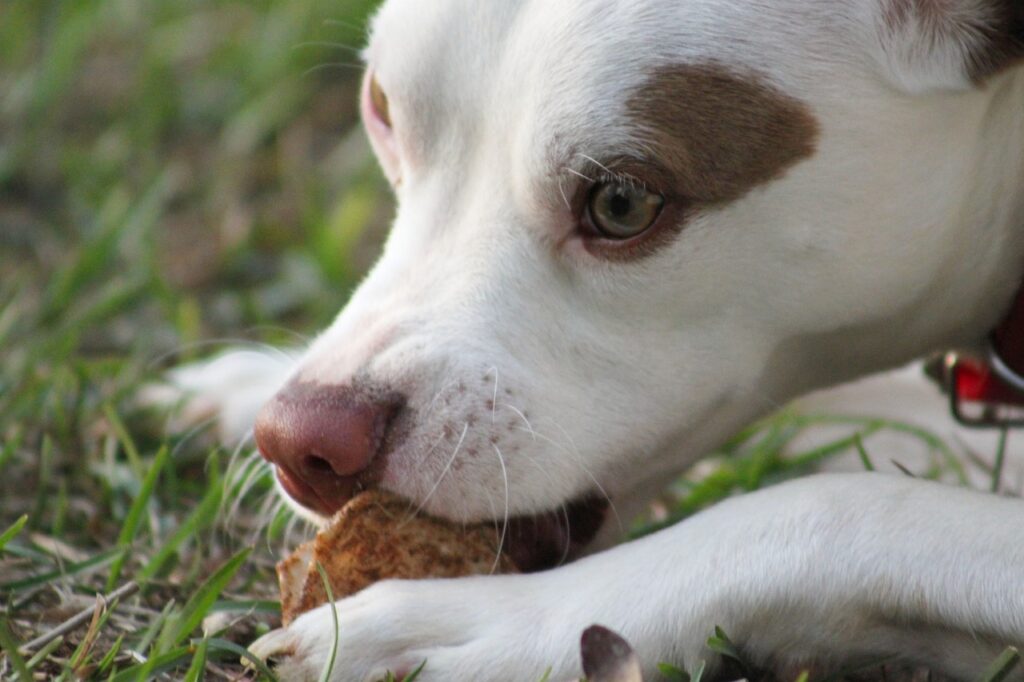Shea butter has become a popular natural moisturizer, not just for humans but also for our furry companions. Derived from the nuts of the African shea tree, shea butter contains vitamins A and E and essential fatty acids that provide soothing properties for dry skin.
But is using shea butter on dogs safe? Here’s what you need to know about using shea butter for dogs.
Table of Contents
Is shea butter safe for dogs? Is shea butter toxic if ingested?

Many pet owners constantly seek natural remedies to keep their furry friends healthy and happy. One such remedy that has gained popularity in recent years is shea butter. Derived from the nuts of the African shea tree, shea butter contains vitamins A and E and essential fatty acids that provide soothing properties for dry skin.
However, when it comes to our four-legged companions, caution should always be exercised before introducing any new product into their routine. This article will explore whether shea butter is safe for dogs, shedding light on the potential benefits and risks involved.
You may like: Is Cherry Pie Safe For Dogs? The Benefits and Risks
Can I use shea butter on my dog’s skin?

Shea butter is considered safe for dogs when used topically on the skin. The moisturizing and emollient properties of shea butter can help soothe the dry, itchy skin that dogs often suffer from. Shea butter is also gentle enough on sensitive paws, noses, and ears that tend to get cracked and irritated.
Always use a product specifically for pets when applying shea butter to your dog’s coat and skin. Look for shea butter dog shampoos, conditioners, and creams formulated for canine use. Avoid directly using raw, unrefined shea butter, as it may be too harsh. Refined shea butter that has been purified is a better option.
Potential Risks of Using Shea Butter on Dogs: Dog licked shea butter
Is shea butter good for dogs? While shea butter is usually well tolerated, there are some potential risks to keep in mind:
- Allergies: Like any natural ingredient, some dogs may be allergic to or sensitive to shea butter. Look for signs of irritation, rashes, or increased licking or biting of the areas applied.
- Ingestion: Don’t let your dog ingest or lick shea butter off their skin or fur. Large amounts could cause an upset stomach.
- Blocked pores: heavy shea butter creams could clog pores and cause breakouts if applied excessively. Use a light layer focused only on dry areas.
- Scent reactions: Some scented or flavouring shea butters may contain other ingredients that irritate dogs’ sensitive noses. Stick to fragrance-free shea butter dog products.
Constantly monitor your dog when using any shea butter product to ensure they don’t have any adverse reactions. Consult your vet if you have any concerns.
You May Also Like: is guava bad for dogs? eye-opening Benefits and Risks for Dogs
Natural Remedies for Dog Skin Issues with Shea Butter or Cocoa butter
Here are some ways pet parents can use shea butter to remedy typical dog skin conditions naturally:
- Dry, flaky skin: Massage shea butter into dry areas like the paws, elbows, and stomach to ease flakiness. The vitamins A and E will nourish the skin.
- Itchy, irritated skin: soothe mild allergic reactions, insect bites, and hot spots with shea butter’s anti-inflammatory properties.
- Cracked paws: Hydrate painful, cracked paw pads by gently rubbing shea butter paw balm into fissures. The thick balm creates a protective barrier.
- Nose or ear irritation: Carefully apply a small amount of shea butter ointment to tender noses and ears prone to crusting and rawness.
- Dull, dry coats: Use shea butter-enriched shampoos and conditioners to add shine and softness to lacklustre coats.
- Skin bumps/rashes: The anti-inflammatory properties of shea butter may calm mild skin irritations and promote healing.
Always check with your veterinarian if your dog’s skin issues persist or seem painful. But shea butter can be a nourishing natural solution for general dryness and mild irritations. is shea butter safe for dogs skin? Yes shea butter safe for dogs skin.
How to Apply Shea Butter to a Dog’s Paws

is shea butter safe for dogs paws? Yes, shea butter is generally considered safe to use on dogs’ paws. Specifically, organic, unrefined shea butter can help moisturize and soothe cracked, dry paw pads. Apply just a small amount, rubbing thoroughly into the paws.
Dogs’ paws tend to get rough and cracked from outdoor activities. Apply shea butter to your dog’s paws as part of their grooming routine to keep the pads supple and protected.
Follow these tips when using shea butter paw balms:
- Sit with your dog and gently hold each paw to extend it. Apply when your dog is relaxed.
- Rub a small dollop of the balm thoroughly into the paw pads, especially any visibly cracked areas. Avoid fur between the toes.
- Massage the balm into the paws for 30–60 seconds until it is fully absorbed into the thick pads.
- Reapply balm 1-2 times weekly, especially after outdoor walks on rough terrain. Winter weather may require more frequent applications.
- Monitor your dog’s reaction to ensure they don’t lick off the product immediately. Distract if needed.
- Store shea butter paw balms in a cool, dry place to prevent separation or spoilage of the all-natural ingredients.
With regular conditioning, shea butter paw balms can help repair and protect cracked, dry paws while providing soothing moisture. Always supervise your dog during balm application.
Is It Safe to Use Raw Shea Butter on Dogs?
is shea butter ok for dogs? yes, raw shea butter safe for dogs. Unrefined shea butter retains more natural vitamins, antioxidants, and essential fatty acids. But is using it directly on your dog’s skin safe? Here are some points to consider:
Benefits
- More natural moisturizing properties remain intact
- Higher amounts of vitamins A, E, and F are needed for nourishment
- Anti-inflammatory and antimicrobial compounds not removed
Drawbacks
- Has an earthy, nutty aroma that dogs may dislike
- The texture is grainy rather than smooth
- Maybe comedogenic (pore-clogging)
- Less stable shelf life is prone to spoilage
Best Practices
- Refine raw shea butter at home by melting and straining
- Dilute with other gentle oils like coconut or jojoba oil
- Test on a small patch of skin first to check for reaction
- Use sparingly on targeted areas; only a thin layer
Diluted and refined shea butter is likely the safest option for most dogs. But with proper precautions, using small amounts of raw shea butter could provide added skin benefits. Monitor your dog and discontinue use if any irritation occurs.
Soothing Properties of Shea Butter for dogs dry Skin Conditions
Thanks to its high vitamin and fatty acid content, shea butter has natural properties that can help soothe many canine skin conditions. Some of its benefits for dogs include:
- Moisturizing: Shea is an excellent plant-based emollient that can penetrate a dog’s thick coats to hydrate dry, flaky skin.
- Anti-inflammatory: compounds like cinnamic acid help reduce swelling and irritation from allergies, skin infections, and injuries.
- Antimicrobial: Shea butter contains lauric, caprylic, and stearic acids that have been shown to fight bacteria and fungi that cause secondary skin infections.
- Anti-aging: Vitamins A and E are antioxidants that may help neutralize free radicals and environmental damage to keep skin youthful.
- UV protection: Some sources indicate shea butter contains cinnamate esters with mild sunscreen-like effects to protect dog skin from harmful UV radiation.
- Wound healing: applying shea butter to superficial wounds may help speed recovery by stimulating new tissue growth and cell regeneration.
No studies have looked explicitly at shea butter’s benefits for dogs. But given its proven effects on human skin, shea butter can be considered a gentle, multipurpose balm for soothing dog skin woes when appropriately used.
What Are The Benefits Of Shea Butter For Dogs?
Here are some of the key benefits of shea butter for dogs:
- Moisturizes dry, flaky skin: Shea is an excellent natural emollient that soothes and hydrates cracked, irritated skin.
- Soothes skin allergies: The anti-inflammatory compounds in shea, like cinnamic acid, can help reduce swelling, itchiness, and rashes from allergies.
- Protects against UV rays: Shea is thought to contain cinnamate esters, which may provide mild sunscreen-like effects.
- Anti-fungal and anti-bacterial: Lauric, caprylic, and stearic acids in shea have antimicrobial properties to fight skin infections.
- Wound healing: Shea’s fatty acids and vitamins A and E support new tissue growth and cell regeneration for improved wound healing.
- Fights free radicals: The antioxidants in shea butter may help neutralize damaging free radicals to maintain healthy skin.
- Moisturizes coats: Shea-enriched shampoos and conditioners add shine and softness to dull, dry coats.
- Improves skin elasticity: Vitamins A and E boost healthy cell growth to improve overall elasticity and suppleness.
- Non-greasy carrier oil: Shea absorbs well into the skin and can be used as a base for essential oils.
African shea butter benefits
Here are some of the key benefits of African shea butter:
- Moisturizing – Shea butter is an excellent natural moisturizer. It contains fatty acids that absorb into the skin to hydrate and smooth skin. This helps treat dry skin and improves flexibility.
- Anti-inflammatory – Compounds like cinnamic acid and other antioxidants in shea butter have anti-inflammatory properties. This helps soothe skin conditions like eczema, dermatitis and rashes when used topically.
- Anti-aging – Antioxidants in shea butter also fight free radicals that damage skin cells and cause aging. Using shea butter boosts collagen production to increase skin elasticity and firmness.
- UV protection – Some research indicates that applying shea butter may provide a mild amount of sun protection, around SPF ~6. It blocks some UV rays.
- Improving skin issues – Shea butter has been used to help treat skin disorders like insect bites, acne, blemishes, stretch marks, frostbite, burns, athletes foot and more over many centuries.
Alternatives to Shea Butter for Dog Skincare
While shea butter is generally safe for dogs, some pets may be allergic or intolerant. Here are a few alternative plant-based moisturizers to try:
- Coconut oil has similar moisturizing fatty acids to shea butter. Use organic virgin coconut oil.
- Jojoba oil mimics the skin’s natural oils. Good for paws and noses.
- Olive oil is High in antioxidants like vitamin E that nourish the skin. Opt for light extra virgin olive oil.
- Sunflower seed oil: a Non-greasy oil high in omega-6s to relieve dryness.
- Hemp seed oil contains omega-3s and omega-6s for anti-inflammatory effects.
- Almond oil is a light, fast-absorbing oil high in vitamin E.
- Aloe vera soothes and hydrates irritated skin and hair.
When swapping shea for another botanical oil, perform a patch test first to confirm your dog won’t have an adverse reaction. Introduce new ingredients gradually and monitor your dog’s skin closely.
Moisturizing Effects of Shea Butter for Dry Dog Skin
Dry, flaky skin is a common problem for dogs, especially breeds with sensitivities. Shea butter’s moisturizing properties make it an excellent natural remedy:
- Seals in moisture: Shea butter forms a protective barrier on the skin, sealing in hydration and preventing transepidermal water loss.
- Slows water evaporation: The rich fatty acids help counteract dry air by slowing water evaporation from the skin’s surface.
- Restores lipids: Shea is high in fatty acids like linoleic acid that help restore the skin’s lipid barrier when it loses fats and ceramides.
- Improves elasticity: Vitamins A and E support healthy cell growth to improve the skin’s overall elasticity and suppleness.
- Boosts circulation: Better blood flow to the skin enhances hydration and nutrient delivery to skin cells.
- Calms inflammation by Reducing inflammatory triggers that worsen flaking and irritation.
Choose shea butter dog shampoos and lotions tailored for extra dry, sensitive skin. Focus on massaging shea butter into visibly flaky areas a few times a week to quench the skin’s thirst.
Is Unrefined or Refined Shea Butter Safe for Dogs?
Unrefined shea butter retains more natural vitamins, but refined shea has a more appealing aroma and texture:
Unrefined
- Raw and less processed
- Earthy, smoky scents dogs may dislike
- Grainy, gritty texture
- Higher amounts of vitamins A and E
- Potentially comedogenic
Refined
- Purified via filtration
- Neutral aroma
- Creamy, smooth texture
- Lower vitamin content
- Gentler on skin
Verdict: Refined shea butter is likely safer and better tolerated by dogs. But unrefined shea can be gently filtered at home to retain some of its benefits. Perform a patch test when using either shea type and monitor for reactions.
Best Practices When Using Shea Butter for Dogs Conditioner
When choosing a shea butter dog shampoo or conditioner, follow these tips:
- Avoid dyes or fragrances – Seek out formulas free of artificial scents or colors that may irritate skin.
- Spot test first: try shea conditioner on a small area and wait 24 hours to check for redness or licking.
- Use a moisturizing shampoo. Pair shea conditioner with a hydrating shampoo to avoid stripping oils.
- Focus on dry areas: target shea conditioner on the ends of ears, elbows, stomach, and other visibly flaky spots.
- Rinse thoroughly. Ensure all residue is rinsed to prevent matting and greasiness.
- Brush regularly. Follow with regular brushing to distribute shea’s hydration into the coat evenly.
Using shea butter conditioner 1-2 times per week can help relieve dry, itchy skin and improve coat texture. Monitor your dog’s skin and adjust its use as needed.
Can You Use Scented or Flavoured Shea Butter on Dogs Safely?
It’s best to avoid using strongly scented or flavoured shea butter on dogs. Their sensitive noses may react negatively.
Potential issues with scented/flavored shea include:
- Skin irritation: fragrance chemicals may cause red, itchy skin when applied topically.
- Respiratory irritation: scented shea near a dog’s nose could trigger breathing issues.
- Gastrointestinal upset – Dogs may get nauseous or vomit if they lick off flavoured shea.
- Increased licking – Tasty scents encourage dogs to immediately lick off shea before it can absorb into their skin.
- Allergic reactions: Dogs may be allergic to synthetic fragrance components without owners realizing it.
Stick to lightly scented or fragrance-free shea butter products formulated for pets. Avoid shea butter containing chocolate, peanuts, cinnamon, peppermint, or citrus oils that are toxic for dogs. Supervise your dog to prevent excessive licking after applying any shea product.
How Much Shea Butter Is likely To Be Too Much For a Dog?
Shea butter is a natural extract that is edible for humans, but it may not be suitable for dogs. If your dog ate pure shea butter, it could potentially be too much for them and cause an upset stomach. The best way to determine how much dog ate shea butter is to consult with your veterinarian.
They can help you decide on the right amount of shea butter to give your dog based on their size, age, and health condition. It’s important to remember that too much shea butter can cause digestive issues in dogs so it’s best to err on the side of caution when giving it to them.
Conclusion: Is shea butter safe for dogs?
Shea butter can be a safe and effective natural moisturizer for dogs to soothe common skin conditions like dryness, irritations, rashes, cracked paws, and dull coats. Its antioxidants, vitamins, and essential fatty acids provide hydrating and anti-inflammatory properties. Opt for pet-friendly shea butter products free of harsh chemicals.
Perform a patch test before use, and monitor your dog for any adverse reactions. Used in moderation, shea butter can be a nourishing skin-healing solution for man’s best friend. But as with any new product, proceed with caution and consult your vet if skin issues worsen or persist. Shea butter can become a healthy addition to your dog’s skincare regimen with some prudent trial and error.
FAQS: shea butter safe for dogs?
Is shea butter toxic to dogs if they lick it?
Shea butter is not toxic, but dogs should not ingest large amounts. Use caution and monitor licking.
Can shea butter help my dog’s dry, itchy skin?
Yes, shea is great for moisturizing and soothing dry, flaky, irritated skin when applied topically.
What’s the best way to apply shea butter to my dog?
Focus on massaging visibly dry areas like the paws, elbows, and stomach. Only use a thin layer.
Should I buy refined or unrefined shea butter for my dog?
Refined shea butter is likely safer for dogs as it has a neutral scent and a smoother texture.
Are there any risks of using shea butter on my dog?
Allergies, skin irritation, blocked pores, and stomach upset if ingested are potential but rare risks. Do a patch test.
are dogs allergic to shea butter?
Shea butter is generally safe for dogs due to hypoallergenic ingredients. Benefits include moisturizing and soothing skin. Introduce slowly to confirm tolerance.







